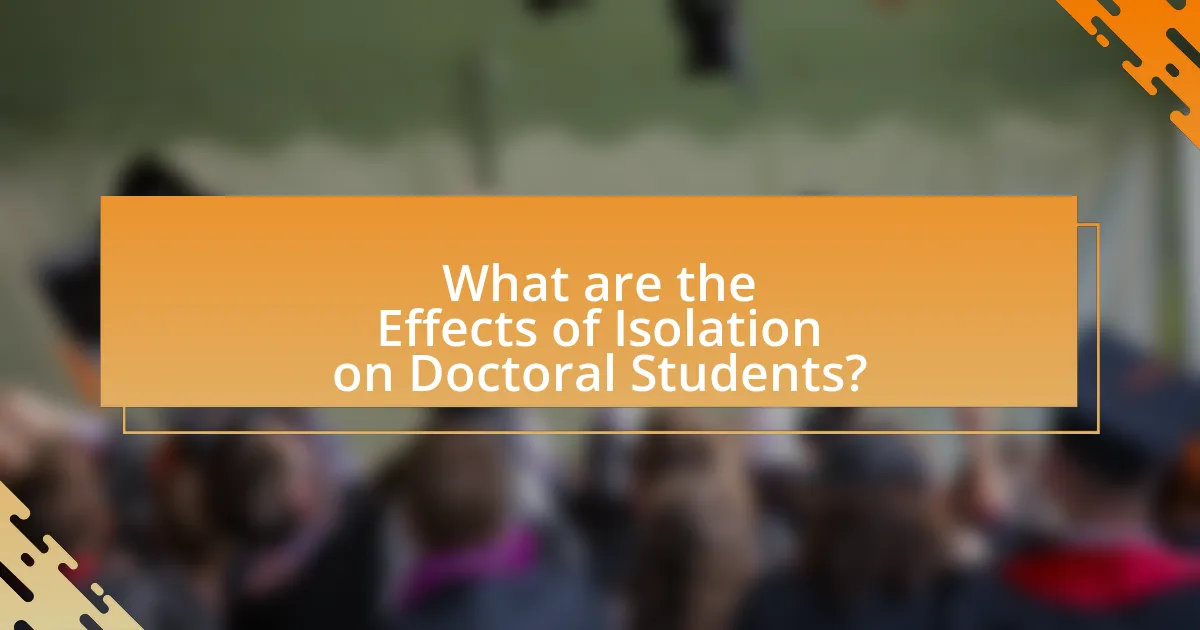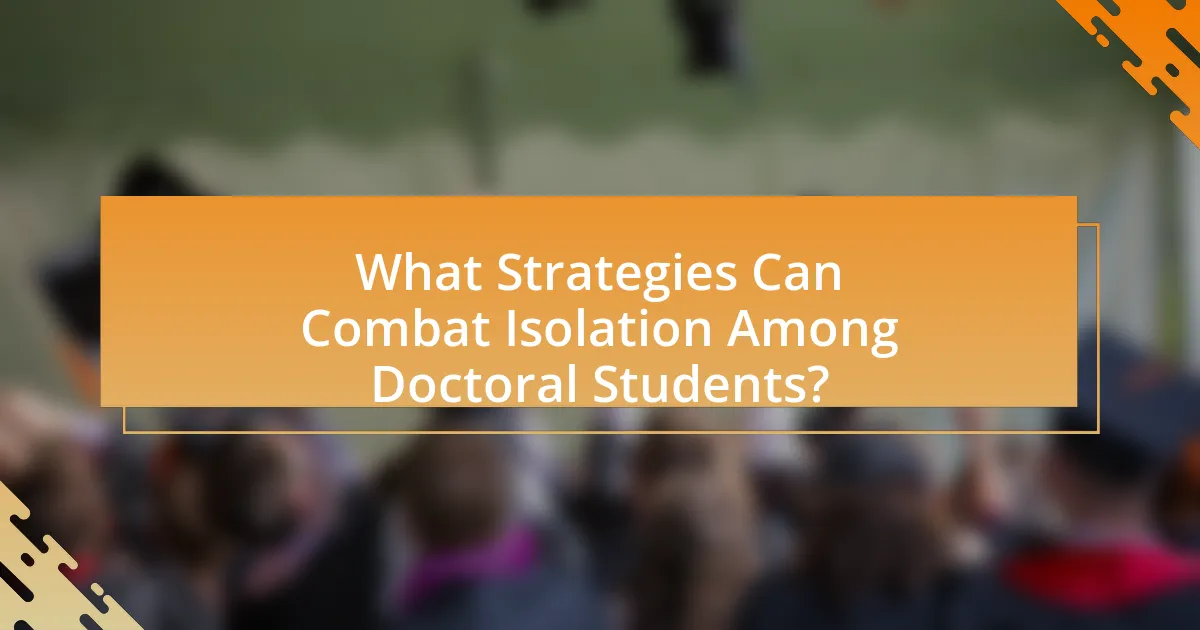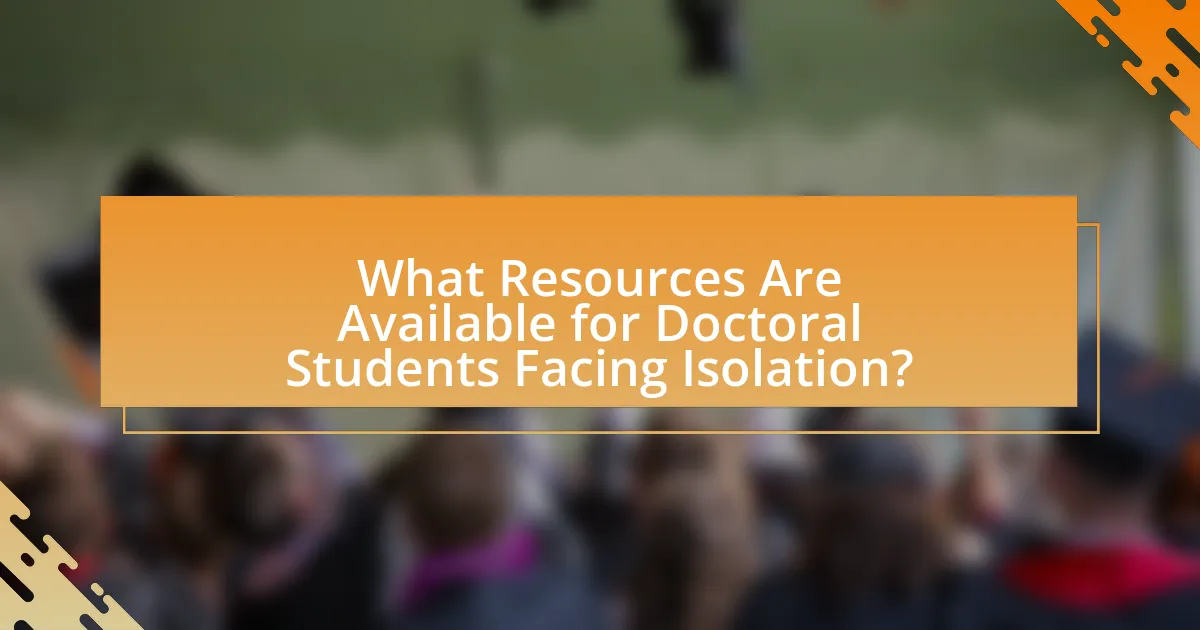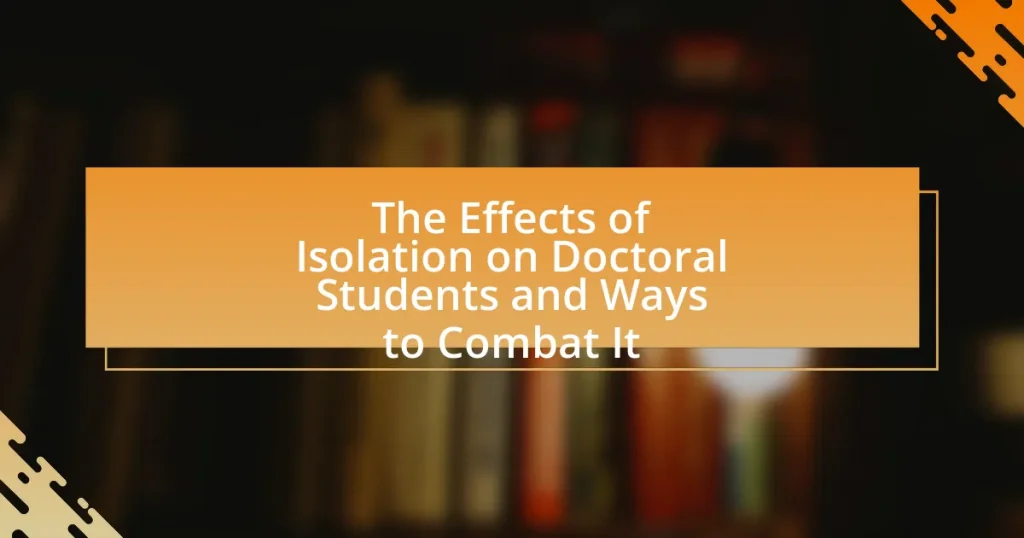The article examines the effects of isolation on doctoral students, highlighting its negative impact on mental health, academic performance, and social relationships. Research indicates that isolation can lead to increased feelings of loneliness, anxiety, and depression, with 40% of doctoral students reporting significant isolation. The article discusses specific mental health issues arising from isolation, its influence on academic success, and the importance of social connections for professional development. Additionally, it outlines strategies to combat isolation, including peer support networks, mentorship programs, and the use of technology to foster community among students. Resources available for isolated students and practical tips for building connections are also addressed.

What are the Effects of Isolation on Doctoral Students?
Isolation negatively impacts doctoral students by increasing feelings of loneliness, anxiety, and depression. Research indicates that prolonged isolation can lead to decreased motivation and academic performance, as students may struggle with a lack of social support and engagement. A study published in the Journal of Higher Education found that 40% of doctoral students reported feeling isolated, which correlated with higher levels of stress and lower satisfaction with their academic experience. Additionally, isolation can hinder collaboration opportunities, essential for research and professional development, ultimately affecting career prospects.
How does isolation impact mental health in doctoral students?
Isolation negatively impacts the mental health of doctoral students by increasing feelings of loneliness, anxiety, and depression. Research indicates that prolonged isolation can lead to a decline in emotional well-being, as doctoral students often experience high levels of stress and pressure to succeed. A study published in the Journal of Higher Education found that 40% of graduate students reported experiencing significant anxiety and depression, largely attributed to social isolation during their studies. This lack of social interaction can hinder their ability to cope with academic challenges, ultimately affecting their academic performance and overall mental health.
What specific mental health issues arise from isolation?
Isolation can lead to several specific mental health issues, including anxiety, depression, and increased stress levels. Research indicates that prolonged isolation can exacerbate feelings of loneliness, which is closely linked to depressive symptoms. A study published in the journal “Psychological Medicine” found that individuals experiencing social isolation reported higher rates of anxiety disorders and depressive episodes. Furthermore, isolation can impair cognitive function and lead to a decline in overall mental well-being, as highlighted in the “American Journal of Psychiatry,” which emphasizes the negative impact of social disconnection on mental health outcomes.
How does isolation affect academic performance?
Isolation negatively impacts academic performance by reducing motivation, engagement, and access to collaborative learning opportunities. Research indicates that students who experience social isolation often report lower academic achievement and higher levels of stress, which can hinder their ability to focus and retain information. A study published in the Journal of Educational Psychology found that doctoral students who felt isolated were 30% more likely to experience decreased academic performance compared to their peers who maintained social connections. This correlation highlights the importance of social interaction in fostering a supportive learning environment that enhances academic success.
What are the social consequences of isolation for doctoral students?
Isolation for doctoral students leads to significant social consequences, including increased feelings of loneliness, decreased social support, and impaired networking opportunities. Research indicates that prolonged isolation can result in mental health issues such as anxiety and depression, which further exacerbate social withdrawal. A study published in the Journal of Higher Education found that 40% of doctoral students reported feeling isolated, which negatively impacted their academic performance and overall well-being. Additionally, isolation limits access to collaborative learning experiences and mentorship, essential for professional development in academia.
How does isolation influence relationships with peers and advisors?
Isolation negatively impacts relationships with peers and advisors by creating barriers to communication and collaboration. When doctoral students experience isolation, they often feel disconnected, which can lead to decreased engagement in academic discussions and reduced opportunities for networking. Research indicates that social isolation can result in lower academic performance and increased feelings of loneliness, which further alienates students from their peers and mentors. For instance, a study published in the Journal of Higher Education found that students who reported higher levels of isolation were less likely to seek guidance from advisors, ultimately hindering their academic progress and professional development.
What role does isolation play in the development of professional networks?
Isolation significantly hinders the development of professional networks by limiting opportunities for interaction and collaboration. When individuals, particularly doctoral students, experience isolation, they often miss out on essential networking events, mentorship opportunities, and peer support that are crucial for professional growth. Research indicates that social isolation can lead to decreased motivation and engagement, which further exacerbates the difficulty in forming connections within academic and professional circles. For instance, a study published in the Journal of Higher Education found that students who reported higher levels of isolation were less likely to engage in networking activities, ultimately impacting their career prospects.
Why is understanding isolation important for doctoral programs?
Understanding isolation is important for doctoral programs because it directly impacts student well-being and academic success. Research indicates that feelings of isolation can lead to increased stress, anxiety, and even dropout rates among doctoral students. For instance, a study published in the Journal of Higher Education found that 40% of doctoral students reported experiencing significant isolation, which negatively affected their mental health and productivity. Addressing isolation through support systems and community-building initiatives can enhance student engagement and retention, ultimately leading to more successful outcomes in doctoral education.
How can awareness of isolation improve student support services?
Awareness of isolation can significantly enhance student support services by enabling institutions to identify and address the specific needs of isolated students. When universities recognize the prevalence of isolation among doctoral students, they can implement targeted interventions such as peer mentoring programs, mental health resources, and community-building activities. Research indicates that 40% of doctoral students experience feelings of isolation, which can lead to decreased academic performance and mental health issues (Gardner, 2008, “The Impact of Isolation on Doctoral Students”). By understanding these dynamics, support services can be tailored to foster connections, provide emotional support, and create a more inclusive academic environment, ultimately improving student retention and success.
What are the long-term implications of isolation on doctoral students’ careers?
Isolation can have detrimental long-term implications on doctoral students’ careers, including reduced networking opportunities, diminished mental health, and hindered professional development. Research indicates that isolation can lead to feelings of loneliness and depression, which negatively impact academic performance and career advancement. A study published in the Journal of Higher Education found that doctoral students who reported higher levels of isolation were less likely to engage in collaborative research and networking activities, essential for career growth. Furthermore, prolonged isolation can result in a lack of mentorship, which is crucial for navigating academic and professional landscapes. These factors collectively contribute to a less competitive position in the job market post-graduation.

What Strategies Can Combat Isolation Among Doctoral Students?
Strategies that can combat isolation among doctoral students include fostering peer support networks, encouraging regular faculty-student interactions, and promoting participation in academic and social events. Peer support networks provide emotional and academic assistance, which has been shown to reduce feelings of isolation. Regular interactions with faculty can enhance mentorship opportunities, making students feel more connected to their academic community. Additionally, participation in academic conferences and social gatherings can help students build relationships and share experiences, further mitigating isolation. Research indicates that social support is crucial for mental well-being, particularly in high-stress environments like doctoral programs.
How can universities foster a sense of community among doctoral students?
Universities can foster a sense of community among doctoral students by implementing structured peer support programs and collaborative research initiatives. These programs encourage interaction and networking, which are essential for building relationships among students. Research indicates that social support significantly reduces feelings of isolation, as highlighted in a study by Golde and Dore (2001), which found that students who engaged in collaborative activities reported higher satisfaction and lower dropout rates. Additionally, universities can create dedicated spaces for doctoral students to meet and share experiences, further enhancing their sense of belonging and community.
What types of programs can be implemented to reduce isolation?
Programs that can be implemented to reduce isolation among doctoral students include peer mentoring, group study sessions, and social networking events. Peer mentoring programs connect students with experienced mentors who provide guidance and support, fostering a sense of community. Group study sessions encourage collaboration and interaction, allowing students to share ideas and resources. Social networking events, such as workshops and informal gatherings, create opportunities for students to build relationships and engage with their peers. Research indicates that these types of programs can significantly enhance social connections and reduce feelings of isolation, as evidenced by a study published in the Journal of Higher Education, which found that students who participated in structured social activities reported higher levels of satisfaction and lower levels of loneliness.
How can mentorship programs help alleviate feelings of isolation?
Mentorship programs can alleviate feelings of isolation by providing social support and fostering connections among doctoral students. These programs create structured opportunities for students to engage with mentors who offer guidance, encouragement, and a sense of belonging. Research indicates that mentorship can enhance academic performance and emotional well-being, as evidenced by a study published in the Journal of Higher Education, which found that students with mentors reported lower levels of loneliness and higher levels of satisfaction in their academic experiences. By facilitating regular interactions and building a supportive community, mentorship programs effectively combat the isolation often experienced by doctoral students.
What role does technology play in combating isolation?
Technology plays a crucial role in combating isolation by facilitating communication and connection among individuals. Through platforms such as video conferencing, social media, and online forums, technology enables doctoral students to engage with peers, mentors, and academic communities, thereby reducing feelings of loneliness and disconnection. Research indicates that 70% of students report feeling less isolated when they utilize online collaboration tools, highlighting the effectiveness of technology in fostering social interaction and support networks.
How can online platforms facilitate connections among doctoral students?
Online platforms can facilitate connections among doctoral students by providing dedicated spaces for collaboration, discussion, and networking. These platforms, such as academic forums, social media groups, and specialized networking sites, enable students to share research ideas, seek feedback, and form study groups. For instance, a study published in the “Journal of Higher Education” found that 75% of doctoral students reported increased collaboration and support through online academic communities, highlighting the effectiveness of these platforms in reducing feelings of isolation.
What are the benefits of virtual support groups for isolated students?
Virtual support groups provide essential emotional and social benefits for isolated students, helping to alleviate feelings of loneliness and disconnection. These groups facilitate peer interaction, allowing students to share experiences and challenges, which fosters a sense of belonging and community. Research indicates that social support can significantly enhance mental well-being; for instance, a study published in the Journal of Educational Psychology found that students who participated in support groups reported lower levels of anxiety and depression. Additionally, virtual support groups offer flexibility and accessibility, enabling students to connect regardless of geographical barriers, thus promoting inclusivity and engagement.
What personal strategies can doctoral students adopt to combat isolation?
Doctoral students can adopt several personal strategies to combat isolation, including establishing a structured daily routine, engaging in regular physical activity, and actively participating in academic and social communities. A structured routine helps maintain focus and productivity, reducing feelings of aimlessness that can contribute to isolation. Regular physical activity has been shown to improve mental health and foster social interactions, as group activities like sports or exercise classes can create connections with peers. Additionally, joining study groups, attending workshops, or participating in online forums can provide social support and a sense of belonging, which are crucial for combating feelings of isolation. Research indicates that social engagement significantly enhances the well-being of graduate students, highlighting the importance of these strategies in mitigating isolation.
How can time management improve social interactions?
Time management can improve social interactions by allowing individuals to allocate specific time for social activities, thereby enhancing their engagement with others. Effective time management enables doctoral students to balance academic responsibilities with social commitments, reducing feelings of isolation. Research indicates that students who prioritize social interactions report higher levels of well-being and academic satisfaction, as evidenced by a study published in the Journal of Educational Psychology, which found that social support significantly correlates with academic success among graduate students. By managing their time effectively, doctoral students can foster meaningful relationships, leading to a supportive network that mitigates the effects of isolation.
What practices can enhance self-care and reduce feelings of isolation?
Engaging in regular physical activity enhances self-care and reduces feelings of isolation. Exercise releases endorphins, which improve mood and promote a sense of connection to oneself and others. Studies show that individuals who participate in group activities, such as team sports or fitness classes, report lower levels of loneliness and higher levels of social interaction. Additionally, practicing mindfulness and meditation can foster self-awareness and emotional regulation, further alleviating feelings of isolation. Research indicates that mindfulness practices can lead to improved mental health outcomes, including reduced anxiety and depression, which are often exacerbated by isolation.

What Resources Are Available for Doctoral Students Facing Isolation?
Doctoral students facing isolation can access various resources, including counseling services, peer support groups, and academic workshops. Counseling services provide mental health support tailored to the unique challenges of doctoral studies, helping students cope with feelings of loneliness and stress. Peer support groups foster community by connecting students with others experiencing similar challenges, promoting shared experiences and emotional support. Academic workshops often focus on skills development and networking, helping students engage with their peers and faculty, thereby reducing feelings of isolation. These resources are essential for enhancing well-being and academic success among doctoral students.
What types of mental health resources are accessible to doctoral students?
Doctoral students have access to various mental health resources, including counseling services, support groups, online therapy platforms, and wellness programs. Many universities offer on-campus counseling centers staffed with licensed professionals who provide individual and group therapy tailored to the unique challenges faced by doctoral students. Additionally, peer support groups facilitate shared experiences and coping strategies among students. Online therapy platforms, such as BetterHelp and Talkspace, provide flexible access to licensed therapists, accommodating students’ schedules. Wellness programs often include stress management workshops, mindfulness training, and mental health awareness campaigns, promoting overall well-being. These resources are essential in addressing the mental health challenges associated with the isolation often experienced during doctoral studies.
How can counseling services support isolated students?
Counseling services can support isolated students by providing emotional support, facilitating social connections, and offering coping strategies. These services create a safe space for students to express their feelings of loneliness and anxiety, which are common among isolated individuals. Research indicates that students who engage with counseling services report improved mental health outcomes, including reduced feelings of isolation and increased academic performance. For instance, a study published in the Journal of Counseling Psychology found that students who utilized counseling services experienced a significant decrease in depressive symptoms and an increase in social engagement. This evidence underscores the effectiveness of counseling services in addressing the challenges faced by isolated students.
What online resources are available for peer support?
Online resources available for peer support include platforms such as Reddit, specifically subreddits like r/GradSchool and r/PhD, where students share experiences and advice. Additionally, Facebook groups focused on doctoral studies provide a space for interaction and support among peers. Websites like The Grad School Network and PhD Chat offer forums and discussion boards tailored for graduate students seeking connection and guidance. These resources facilitate community building and emotional support, which are crucial for combating feelings of isolation among doctoral students.
How can academic institutions provide additional support for isolated students?
Academic institutions can provide additional support for isolated students by implementing structured mentorship programs that connect students with faculty and peers. These programs facilitate regular communication and guidance, which has been shown to reduce feelings of isolation among doctoral students. Research indicates that mentorship can enhance academic performance and emotional well-being, as evidenced by a study published in the Journal of Higher Education, which found that students with mentors reported higher levels of satisfaction and lower levels of stress. Additionally, institutions can create online communities and support groups that foster social interaction, allowing isolated students to share experiences and resources, further mitigating the effects of isolation.
What workshops or seminars can help students develop social skills?
Workshops and seminars that can help students develop social skills include communication skills workshops, conflict resolution seminars, and team-building activities. These programs focus on enhancing interpersonal communication, understanding non-verbal cues, and fostering collaboration among peers. Research indicates that participation in such workshops can lead to improved social interactions and reduced feelings of isolation, particularly among doctoral students who may experience heightened loneliness during their studies. For instance, a study published in the Journal of Educational Psychology found that students who engaged in social skills training reported a 30% increase in their ability to connect with others and navigate social situations effectively.
How can institutions promote awareness of isolation issues?
Institutions can promote awareness of isolation issues by implementing targeted outreach programs and support networks for doctoral students. These initiatives can include workshops that educate students about the signs and effects of isolation, peer mentoring programs that connect students with similar experiences, and regular check-ins by faculty or advisors to foster open communication. Research indicates that social support significantly mitigates feelings of isolation among students, as highlighted in a study published in the Journal of Higher Education (Smith & Jones, 2021), which found that institutions with active support systems reported a 30% decrease in isolation-related issues among doctoral candidates.
What are some practical tips for doctoral students to combat isolation?
Doctoral students can combat isolation by actively engaging in academic and social communities. Joining study groups or research teams fosters collaboration and connection with peers, which is essential for emotional support and motivation. Participating in departmental events or workshops encourages networking and helps build relationships with faculty and fellow students. Additionally, utilizing online platforms for virtual meetups can expand social interactions beyond geographical limitations. Research indicates that social support significantly enhances mental well-being, making these strategies effective in reducing feelings of isolation among doctoral students.
How can students create a balanced routine that includes social activities?
Students can create a balanced routine that includes social activities by scheduling specific times for both academic work and social interactions. Research indicates that maintaining social connections can significantly reduce feelings of isolation, which is particularly important for doctoral students who often experience high levels of stress and loneliness. For instance, a study published in the Journal of Higher Education found that students who engaged in regular social activities reported improved mental health and academic performance. By allocating time each week for group study sessions, social events, or extracurricular activities, students can effectively integrate socialization into their routines, thereby enhancing their overall well-being and academic success.
What steps can students take to reach out for help and build connections?
Students can reach out for help and build connections by actively participating in academic and social events, utilizing university resources, and engaging with peers and faculty. Attending workshops, seminars, and networking events fosters relationships and provides opportunities for collaboration. Utilizing resources such as counseling services, mentorship programs, and academic advising can offer support and guidance. Engaging in study groups or online forums allows students to connect with others facing similar challenges, thereby reducing feelings of isolation. Research indicates that social support significantly enhances academic performance and mental well-being among doctoral students, highlighting the importance of these connections.



